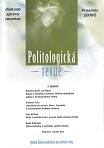Zájmové skupiny v politickém systému Norska
Organized Interests in the Political System of' Norway
Author(s): Aneta ValterováSubject(s): Politics / Political Sciences
Published by: Česká společnost pro politické vědy
Keywords: interest groups; Norway; neo-corporatism; pluralism
Summary/Abstract: The article provides an analysis of the system of organized interests of Norway, a country traditionally depicted as an example of a (neo)corporativist system. The article is divided into four chapters: The first deals with the relation of Norwegian organized interests and the executive and legislature, while the second analysis the position of the trade unions and employer's organizations with special regard to the Norwegian tripartite. The third chapter focuses on the sectoral interest groups and the fourth on the non-profit sector. The position of organized interests, their role in the political system and the main ways of exerting influence on the political process are analyzed. The Norwegian political system is still characterized by an important role of the interest groups however their position in the political system nowadays is different. The role of the institutionalized (corporate) channel or interest group influence is no longer dominant, although it is still regularly used. Besides the official committees, councils and other advisory bodies forming the corporate channel, the informal channel of influence (above all lobbing and public relations) has become just as important over the past twenty years. Therefore the conclusion of this article is that the Norwegian system of organized interests is no longer (neo)corporativist, but it contains elements of both corporativism and pluralism.
Journal: Politologická revue
- Issue Year: 12/2006
- Issue No: 2
- Page Range: 86-106
- Page Count: 21
- Language: Czech
- Content File-PDF

